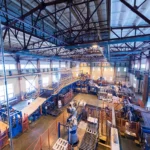Developers reassess timelines as shifting tariffs, tax credits, and funding hurdles reshape the construction landscape.
As economic uncertainty clouds the outlook for clean technology and high-tech manufacturing, developers across the U.S. are pressing pause on billions of dollars in construction projects.
While a few international firms are expanding U.S. operations, a growing number of American developers are postponing or outright canceling major builds due to erratic federal policies—particularly around tariffs, tax incentives, and energy department funding.
Silver Linings Among Dark Clouds

Despite the turbulence, some companies remain bullish on the U.S. market. British construction equipment manufacturer JCB is doubling the size of its San Antonio plant, citing recent tariff policies as a key motivator for reshoring production. Similarly, pharmaceutical giant Novartis has committed $23 billion to building and expanding facilities across Florida, Texas, New Jersey, and California.
But such cases are proving to be outliers.
According to Ken Simonson, Chief Economist for the Associated General Contractors of America, these high-profile expansions are overshadowed by the growing wave of project cancellations and delays, particularly in the clean tech and EV sectors.
Clean Tech Cools Off
The electric vehicle (EV) boom that energized the construction industry just a year ago is now showing signs of fatigue. Projects tied to EV battery manufacturing—once accounting for nearly half of all new manufacturing construction—are being abandoned at record rates.
In the first quarter of 2025 alone, U.S.-based EV and battery manufacturers canceled more projects than in the previous two years combined, per data from Atlas Public Policy.
Sophie Latham, a policy associate with Atlas, points to murky timelines for Department of Energy loan approvals and instability around tariff regulations and tax credits as key reasons behind the slowdown.
“These incentives often determine whether companies build in the U.S. or look abroad,” she explained.
A recent BloombergNEF report echoes this cautionary outlook, estimating that nearly half of the $30 billion in clean tech projects originally slated for 2025 may face significant delays or get scrapped altogether.
Major Projects on Ice
Several marquee projects have already hit the brakes. Idaho-based KORE Power shelved its $1.25 billion Arizona battery facility, opting instead to retrofit an existing plant due to loan issues and cost concerns.
Tech leader Intel has delayed construction of its Ohio semiconductor facility, citing higher costs and weaker chip demand. And Microsoft has suspended several U.S. data center builds, including a $1 billion project in Columbus, Ohio.
Even the International Recycling Group, which had planned a $300 million advanced recycling plant in Erie, Pennsylvania, pulled the plug. CEO Mitch Hecht expressed deep frustration, pointing to rejected federal loans and new tariffs as pivotal setbacks: “After 18 years working to bring this vision to life, I’m devastated.”
Legal Experts Urge Strategic Flexibility
Attorneys specializing in trade law say the current environment calls for careful navigation. New reciprocal tariffs layered over Section 232 duties for key construction materials like aluminum and steel have complicated procurement decisions.
“Companies now need to evaluate each supply chain component for tariff exposure, exemptions, and customs compliance,” said Stephan Becker, partner at Pillsbury law firm. Missteps can lead to accusations of customs fraud or missed exemption opportunities.
Some relief may be found through programs like bonded warehouses or foreign trade zones, which allow materials to be stored without immediate tariff payments.
Looking Ahead
As Washington’s stance on trade and tax policy continues to shift, developers are left in limbo. For many, the future of their projects hinges on whether incentives stabilize—or vanish.
“The playing field keeps changing,” said Latham. “Tariffs and tax credits are no longer just economic levers; they’ve become project lifelines.”








